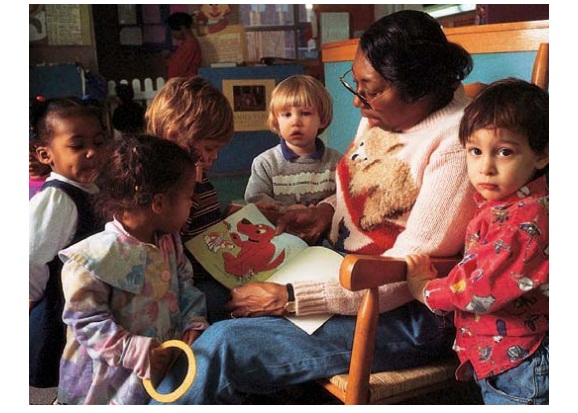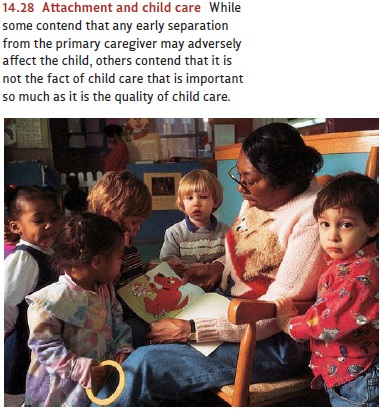Chapter: Psychology: Development
The Impact of Child Care - Socioemotional Development in Infancy and Childhood

THE IMPACT OF CHILD CARE
Families
differ not only in their parenting but also in their childcare arrangements. In
the United States, most children grow up in households in which both parents
work outside the home (National Research Council and Institute of Medicine,
2000); the situation is the same in many other countries. As a result, children
often stay long hours each day with babysitters or professional childcare
providers; in most of these cases, the child receives less one-on-one adult
time and spends more time with other children. How does this influence
children’s development?
Reassuringly,
research indicates that childcare centers do not harm children in any way
(NICHD Early Child Research Network, 2001, 2003, 2006); in fact, high-quality
childcare seems in some cases to promote the child’s social competence (Figure
14.28). This optimistic assessment, however, must be tempered with concerns
about variation in the quality of the
childcare. In high-quality settings, the caregivers have had some train-ing in
child development and are usually warm, expressive, and responsive to the
chil-dren’s needs. In these settings, there are usually no more than a half-dozen
toddlers per adult caregiver. In lower-quality settings, none of these
conditions are met, and the forecast is correspondingly less positive (Love et
al., 2003; N. L. Marshall, 2004; NICHD Early Child Care Research Network,
2006). One study indicated that infants enrolled in poor-quality daycare
centers end up inattentive and unsociable in pre-school, compared to children
who spent the same amount of time in good daycare centers (Howes, 1990). In a
similar study, 4-year-olds who attended higher-quality daycare centers showed
better social and emotional development at age 8 than did children who attended
poorer-quality centers, even when factors such as social class and income were
equated (Vandell, Henderson, & Wilson, 1988).
Even
with lower-quality care, though, we may not need to sound the alarm. Whatever
the quality of the childcare, the main predictor of the child’s status seems to
be the quality of home life, including the par-ents’ sensitivity to the child,
the parents’ health, and so on. As one recent report put it: “The primary
conclusion is that parenting matters

much
more than does child care”. Thus, poor-quality childcare can cause problems,
but these problems are much less likely if the parents are responsive to the
child’s needs. Even if the parents are relatively unresponsive, the magnitude
of the childcare effects is small.
Related Topics